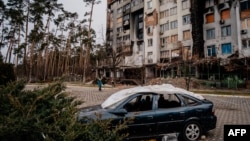Russian forces attacked Ukraine with missiles Thursday, hitting targets across the country, killing at least one person and wounding seven others.
Ukrainian officials said Ukraine’s air defenses shot down 16 of 36 Russian missiles, a lower success rate than in some previous waves of attacks.
Ukraine said the latest round of attacks came with a new Russian strategy, with Moscow’s forces deploying what Andriy Yermak, head of Ukraine's presidential office, described as "active reconnaissance" and "false targets."
Russian troops launched balloons with corner reflectors to deceive Ukraine's air defense systems, said Oleksiy Danilov, the secretary of Ukraine's National Security and Defense Council.
"This indicates that [the Russians] are preparing and not sleeping," Danilov said on Ukrainian TV, "and they are starting to use other methods."
One of the overnight strikes caused casualties and destroyed homes in the eastern city of Pavlohrad. The strike destroyed seven homes, damaged 30 others and sparked a fire at an industrial plant that emergency services put out within hours, one official said.
The latest round of Russian aerial attacks came as Norway approved a five-year aid package for Ukraine, totaling $7 billion.
Ukrainian President Volodymyr Zelenskyy said the move makes Norway and Ukraine stronger, and that Russia will not overcome “the unity of all those that cherish freedom.”
"Now you're setting a very important precedent for long-term financial support to a country that defends its independence and the right of every nation to live in accordance with generally recognized international norms,” Zelenskyy told Norwegian lawmakers via video link.
In Washington, a bipartisan group of U.S. senators introduced legislation Thursday that would require Secretary of State Antony Blinken to designate the Wagner Group, a Russian paramilitary organization fighting for Moscow in Ukraine, as a terrorist organization.
“There is no question that the Wagner Group has murdered journalists, kidnapped children, raped women, engaged in savage, barbarous conduct that gives new meaning to the word terrorists," Democratic Senator Richard Blumenthal told reporters. Even though the group has already been sanctioned by the U.S. State Department, Blumenthal said that if passed, the new measure would provide tools for further sanctions.
Ukrainian officials have warned Russia may launch a new offensive as the one-year anniversary of its invasion of Ukraine approaches next week.
Zelenskyy said in his nightly address Wednesday he is confident Ukraine will thwart Russian attempts to “retake the initiative.”
UN resolution
A draft United Nations General Assembly resolution due to be voted on at a special session next week calls for a cessation of hostilities in Ukraine and a peace deal that ensures Ukraine’s “sovereignty, independence, unity and territorial integrity.”
The General Assembly is expected to approve the resolution when it meets February 23, the day before the one-year anniversary of the invasion.
The draft resolution calls on the United Nations and member states to support diplomatic efforts to achieve peace.
The measure also demands that Russia halt attacks on Ukraine’s civilian infrastructure and immediately withdraw all its military forces from Ukraine.
General Assembly resolutions are not legally binding, but they do carry political weight as a show of world opinion.
Similar action in the U.N. Security Council, which would be legally binding, is not an option since Russia holds one of the five permanent seats with veto power.
The General Assembly has already approved a series of resolutions showing support for Ukraine and criticism of Russia’s military action.
Days after Russia’s invasion, the body voted 141-5 demanding an immediate cease-fire and for Russia to withdraw all its troops. Another resolution weeks later blamed Russia for a humanitarian crisis in Ukraine and demanded access for aid.
U.S. Defense Secretary Lloyd Austin on Wednesday favorably portrayed the Kyiv government’s chances of taking the initiative on the battlefield against Russian forces.
"I think they'll have a real good chance of making a pretty significant difference on the battlefield and establishing the initiative,” Austin told reporters after a meeting with NATO defense ministers in Brussels. “And being able to exploit that initiative going forward.”
He said that as NATO countries prepare to ship munitions to Ukraine, the U.S.-led military alliance is intent on training troops on their use.
"We're laser-focused on making sure that we provide a capability and not just the platform," he said.
Austin disparaged Russian President Vladimir Putin and Moscow’s battlefield performance, saying on Twitter, “Nearly a year since Putin’s reckless war of choice … things haven’t gone the way that the Kremlin planned. NATO is more unified and more resolute than ever.”
Some material in this report came from The Associated Press and Reuters. National Security correspondent Jeff Seldin contributed to this report.








